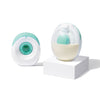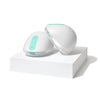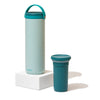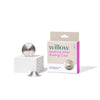Meet Dr. Redman! She's the Associate Professor and Director of the Reproductive Endocrinology & Women’s Health Research Program and the Maternal Nutrition Core Laboratory. Her research portfolio is focused on how lifestyle, nutrition and physical activity influence body composition & metabolism.
"The cornerstone of her work is focused on how to best work with primary care physicians and within the WIC program to counsel pregnant women on healthy weight gain. Her work has produced >150 research articles on nutrition, exercise, weight management, breastfeeding, and gestational diabetes and she's at the forefront of developing and testing e-health technologies, such as smartphone apps, for delivery of complex lifestyle interventions and enhancing the compliance to national dietary and exercise guidelines."
Keep reading for more on Dr. Redman, her thoughts on early motherwood and what she thinks are the biggest challenges breastfeeding moms face today.| Q: |
Please tell us a little bit about your background and area of expertise. |
"I am a Professor of physiology in the Division of Clinical Science at Pennington Biomedical Research Center in Baton Rouge, Louisiana. I completed a PhD in obstetrics and gynecology and physiology and use this knowledge to study women’s health and maternal and infant nutrition. I direct an exciting research program that seeks to understand how the health of a mother impacts the health of her offspring. Our research spans a broad spectrum of topics including pregnancy weight gain, obesity, gestational diabetes, the benefits of lifestyle changes on pregnancy and birth outcomes, breastmilk composition and infant feeding. We work with many stakeholders including healthcare providers but more importantly women, pregnant people and new parents to ensure our research is relevant and important and can lead to positive and informative changes for the people we serve."
| Q: |
What inspired you to enter this space? |
"I was raised in a family and community where healthy eating and being physically active was our way of life. As an avid high school athlete, I first set out to pursue a career in elite athletic performance. Not as an athlete but an exercise scientist hoping to learn how to optimize performance for female athletes. It wasn’t until I completed my PhD in this area and moved to the US to study athlete performance further, that I realized the extent poor health that is, ‘unbalanced diets’ and physical inactivity was having on women’s health. I learned that the most common cause of infertility in women, many complications in pregnancy could be prevented with healthier lifestyle habits. I also learned that a mothers’ health and habits in pregnancy shape the body size and metabolism of her baby and influence the risk of that child to develop chronic diseases. So, I pivoted my career and research goals almost 180 degrees. Mothers have one thing in common – we all desire to have a wonderful pregnancy and a healthy baby. With nutrition education removed from K-12 curriculums I realized that we needed to bring this important education to mothers in other ways. My research mobilizes the voices of women and engaged them in the co-design of programs to benefit their health and the health of their babies. We also perform highly sophisticated research as well to understand how factors in the diet and our lifestyle and our body impact how and why pregnancy complications occur and how and why chronic diseases are passed onto our children through pregnancy. With overweight and obesity affecting more than two-thirds of women, our work is not yet done. I am excited to look back on my career one day to see the impact of our discoveries and programs on the health of women and babies."
| Q: |
Tell us how you really feel about early motherhood… |
"I wouldn’t say that I LOVED being pregnant, but I did LOVE birth and I did LOVE having the privilege to nurse my three children. It was interesting when I finally experienced motherhood for myself. I too needed to synthesize the mountain of information out there and to adapt all the advice into my own practices. I remember with my first child, feeling completely overwhelmed. I didn’t expect that. I knew, I would be tired and I knew I would feel my body in places I hadn’t felt it before. Yet, I wasn’t prepared for breastfeeding to be such an ‘art’ and also a ‘science’. Thinking about the latch, the hold, the timing, which side, the wet and dirty diapers, the letdown, the nuances of my pump…I found great support in mothers’ groups I joined on social media. I was a late bloomer you can say to motherhood. If only I was a bit younger, I would definitely be having more children."
| Q: |
What are some of the biggest issues facing breastfeeding moms today and how do you see that changing in the next 5-10 years? |
"Let’s start with the positive things here. I love that in the past 5 to 10 years that many of our states in the US have agreed to paid parental leave! I love that more new parents are afforded the right to stay home with their child in those first few weeks. Being able to establish a bond with your newborn and heal your body in the 4th trimester should not be a right we have had to request in this country, but it is and finally it is a reality for many families. As more and more families have two working parents we still need better support in the workplace for nursing mothers to express milk. Some mothers are afforded a lactation room but many, especially those who have hourly employment in the food industry or retail do not yet have these facilities. We must continue to advocate for sanitary areas in workplace for people to express and store human milk at work. Breastmilk is without a doubt liquid gold. As more research techniques are better able to measure what is the milk, we will likely learn not only the positive components influencing the health of our babies, but also negative components as well. The challenge will be how to educate mothers on which factors in milk are coming from our behavior and lifestyle choices or from where we live and how to minimize them.
| Q: |
If there’s one thing you’d like readers to take away from this interview, what would it be? |
"I might have a few extra letters after my name but like you, I am a mother. It is my ultimate desire to use my platform to reach all mothers and to help spread education to ensure that each mother and baby can experience the pregnancy, birth and start to life that they desire!"
| Q: |
Did you/ have you breastfed? What was your experience like? What tips do you have for new moms? |
"I nursed all three of my children exclusively for about 6 months and non-exclusively until they each turned one. I was able to feed successfully from the breast and I would express as well to continue to provide milk after I returned to work. I experienced all the issues…latching, cracked nipples, engorgement, mastitis and self-doubt! Fortunately, I really enjoyed nursing. I loved that it was our time together. My advice for new moms is to keep going. Find yourself a few other moms who you can lean on for the silliest of questions. Create a positive manta for yourself to keep all the negative self-talk at bay. It is never too early to pump. And when it is feels too hard today, take a break. There is always tomorrow."

















